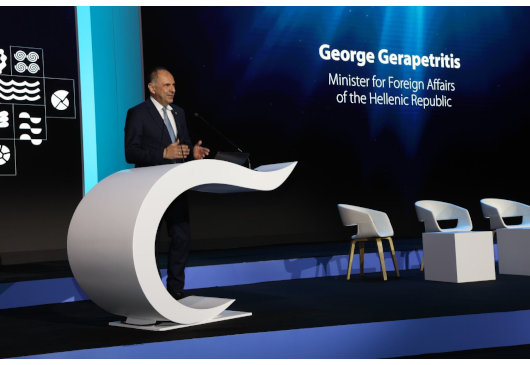 Excellencies, dear Secretary, John Kerry, ladies and gentlemen,
Excellencies, dear Secretary, John Kerry, ladies and gentlemen,
It is with great pleasure that I welcome you to the 9th Our Ocean Conference, an ocean of potential, here in Athens.
First and foremost, I would like to warmly thank you all, heads of state and governments, ministers, high-level participants, national delegations from all over the world, representatives from international organisations, academia, civil society, private sector, and key stakeholders for participating in this event, and for being strongly engaged in this great cause that is the protection of the ocean.
In Greek mythology, Oceanus, Ωκεανός, son of Uranus and Gaea, was a Titan, sometimes identified as the begetter of the gods or as the begetter of all things. Since Antiquity, my country has nurtured an essential connection of vital significance with the ocean.
With an extended coastline of more than 20,000 kilometers and countless islands and islets, Greece has developed a profound connection with the sea and is, therefore firmly committed to protecting the maritime environment.
At the same time, we also saw the potential. Today, the Greek-owned fleet represents over 17% of the world fleet, ranking it first, representing almost one-sixth of the world's tonnage. The Greek economy's receipts from maritime transport in the last five years accounted for over 42% of all receipts from services and 21% of total exports of goods and services.
However, corresponding environmental data are not optimistic. The average global sea level has risen 9.7 centimeters over the past 30 years, with a rate of rise accelerating in recent years. Overfishing has increased from 10% of all fishery stocks in 1974 to 35.4% in 2019. In fact, our region, the wider Mediterranean region, has the second lowest rate of sustainable fishing worldwide.
However, what's good with statistics is that they are perfectly clear. Our ocean is not only an ocean of potential, but actually an element of survival for us all. Currently, global electricity demand is 23,000 terawatt hours. Offshore wind technical potential is 36,000 terawatt-hours per year for installations in water less than 60 meters deep and within 60 kilometers from shore.
Moving further from shore and into deeper waters, floating turbines could unlock enough potential to meet the world’s total electricity demand 11 times over in 2040.
The ocean can save us, but we have to save the ocean first.
Ladies and gentlemen, it has been 10 years since the first Our Ocean conference was organised following John Kerry's initiative.
Today, by hosting the 9th Our Ocean conference, Greece undertakes the commitment to further foster this idea that inspired the international community and created a new result-oriented model of action for the protection of the oceans.
Aiming to host a successful and inclusive conference this year, we have made a sincere effort to bring together the highest possible number of states, facilitating the participation of small island developing states, as well as a wide range of stakeholders in ocean protection and management.
We have also involved in this process the voice of the youth who can provide fresh perspectives and innovative ideas and drive meaningful progress towards ocean sustainability. Because after all, the preservation of the ocean is a matter of intergenerational sustainability.
At the same time, we have worked towards raising awareness and promoting the key messages of our Ocean Conference to the highest possible level, preserving its urgency in the global environmental agenda. Through collaboration and concerted global action, we do hope and wish this effort will bring forth fruitful results for the protection and conservation of the oceans and the seas, as well as the sustainable use of marine resources.
There is a pressing need for concrete steps in all relevant major issues such as climate change, marine protected areas, sustainable fishing, sustainable blue economy, maritime security, and maritime pollution.
Greece, in its effort to enrich the conference agenda, decided to put emphasis on four cross-cutting themes as horizontal elements across the six areas of action of the conference, namely sustainable tourism in coastal areas and islands, green shipping, reduction of marine plastic and microplastic, and green transition in the Mediterranean.
Ladies and gentlemen, by hosting this conference, Greece aspires to reaffirm its commitment to the transition towards a blue economy and to underscore the advantages of a new balance between economic growth, social cohesion, and sustainability. Our goal is to stimulate tangible action and to announce commitments, both regionally and globally, on all major issues concerning the ocean and the seas.
Ladies and gentlemen, immediate and forceful actions are needed, and we must work together to find sustainable solutions.
After all, oceans and seas connect us all. We owe it to the future generation. We must not forget we are not the owners, but merely the caretakers of the Earth.
From São Tomé and Príncipe to Palau and from Madagascar to Canada, the green heart of the world is beating today and tomorrow here in Athens.
Let's all commit to a better future for the next generations.
Thank you.
April 16, 2024


